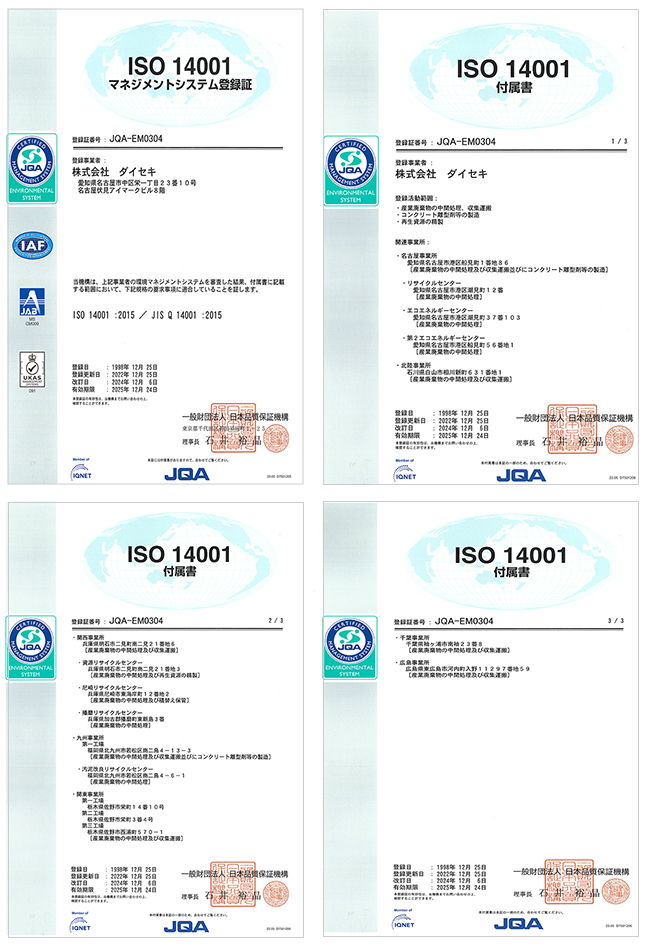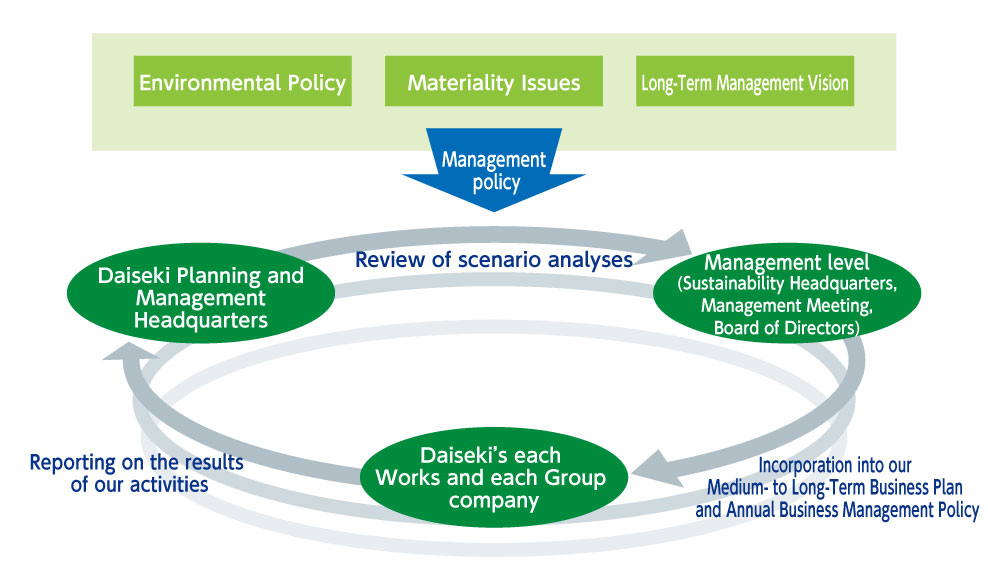Environmental management structure
The Daiseki Group has established an environmental management structure based on the Daiseki Group Environmental Policy, Materiality, and Management Strategy. We are also striving to improve this structure through regular reviews based on internal and external checks.
Daiseki Group Environmental Policy
The Daiseki Group has established the Daiseki Group Environmental Policy based on our Management Principles and in the spirit of the SDGs.
Daiseki Group Environmental Policy
At the Daiseki Group, we understand the spirit of the Sustainable Development Goals (SDGs), which were adopted by the United Nations, under the Management Principles of “Ideas, Plans, Structures, Actions,” while aiming to be Asia’s No. 1 recycling company with our purpose of being “an environment-creating company contributing to society through the environment by making the best use of limited resources.” We operate our environmental management system based on the following environmental policy.
1. Scope of application
This policy applies to all officers and employees (including non-regular employees, part-time employees, temporary employees, and fixed-term employees; hereafter, “Officers and Employees, etc.”) of the Daiseki Group. We inform Officers and Employees, etc. of this policy by providing them with education and training. We also disclose this policy to the public upon request.
2. Prevention of environmental pollution
We will prevent environmental pollution by ensuring the safe and appropriate collection, transportation, and intermediate treatment of industrial waste and by reducing the environmental impact of our business activities. In this process, we will work to protect nature and biodiversity and achieve a nature positive future.
3. Building a circular economy society
We will effectively utilize various resources in our business activities and ensure efficient resource use. We will also make the most effective possible use of water resources to reduce water consumption. To build a circular economy society, we will pursue initiatives to improve the recycling rate of the waste we accept and promote the business of creating value and resources from waste.
4. Realizing carbon neutrality
We will replace all of the energy consumed in our business activities with renewable energy by FY2051 and aim for net-zero emissions. We will also push forward with proposals and activities to reduce greenhouse gas emissions by collaborating with the national government, local communities, and our suppliers.
5. Complying with environmental laws and regulations
We will comply with environmental laws and regulations and other required standards.
6. Continuous improvement and education
To comply with environmental laws and regulations, we will provide Officers and Employees, etc. with education and training. We will set environmental targets and goals, review them regularly, and make improvements on a continuous basis.
May 9, 2025
Approved by the Board of Directors of Daiseki
Building of an environmental management system based on ISO14001

ISO 14001 Management System Registration Certifi cate
In 1998, Daiseki acquired its first ISO14001 certification at its Chiba Works. In 2006, we acquired a corporate-wide integrated ISO14001 certification and have successfully renewed the certification to date. Our domestic group companies also continuously engage in environmental conservation activities through the implementation of ISO14001 and Eco-Action 21.
The Daiseki Group has established an environmental management system delivering environmental management led by our President. Our Sustainability Headquarters, comprising Daiseki and our Group company management teams, deliberates on and makes decisions regarding priority matters concerning environmental protection and climate change. We also strive to continuously improve our environmental conservation activities by assessing, evaluating, and correcting the impacts that our business activities have on the environment.
ESG Data: Number of sites that have acquired ISO14001 or Eco-Action 21 certification
Internal environmental audit and external environmental examination
Trained internal environmental auditors regularly conduct internal environmental audits to confirm compliance with the requirement items of ISO14001 or Eco-Action 21, after which relevant departments responsibility make improvements in line with the findings. Once a year, our president conducts a management review based on the findings of the internal environmental audits to confirm that the appropriateness, validity, and effectiveness of our organizations' management systems are being continuously improved. In addition, our company undergoes an external environmental examination by a certification body once a year. The certification body conducts on-site examination, written examination and interviews to check whether the requirement items of ISO14001 or Eco-Action 21 are surely executed. Thus, the Daiseki Group continues to maintain the certification by taking the external environmental examination.
ESG data: Environmental audit execution results
Internal environmental audits
Trained internal environmental auditors regularly conduct internal environmental audits to confirm compliance with matters required by ISO14001, after which relevant departments take responsibility for making improvements in line with the findings. Once a year, our president conducts a management review based on the findings of internal environmental audits to confirm that the appropriateness, validity, and effectiveness of our organizations' management systems are being continuously improved.
Response to TCFD recommendations

The ”Task Force on Climate-related Financial Disclosures” (TCFD*1) established by the Financial Stability Board (FSB) calls on companies to disclose information related to climate change from the standpoint of investors, including information on climate-related risks and opportunities and clarification of governance-related information. In October 2020, we endorsed the recommendations of the TCFD and began an evaluation (scenario analysis*2) of the financial impacts of climate-related risks and opportunities on our management. Going forward, we will leverage the knowledge we have acquired to date to enhance our scenario analysis and examine countermeasures while engaging in information disclosure under the TCFD framework.
*1 TCFD: Task Force on Climate-related Financial Disclosures
*2 “Practical Guide for Scenario Analysis in Line with the TCFD Recommendations 3rd edition" (published March 2021, p. 235-247)
Disclosure based on TCFD recommendations
Response based on TNFD recommendations
The Taskforce on Nature-related Financial Disclosures (TNFD) is an international organization that was conceived at the World Economic Forum Annual Meeting (Davos meeting) in January 2019. In its TNFD recommendations, it requests analysis and disclosure of the impacts of nature and ecosystems on business activities and corporate finances. Our company previously included the assessment of our dependence on natural capital and the related impacts, risks and opportunities in our comprehensive risk management. We are now advancing further analysis and disclosure with reference to the TNFD recommendations and the LEAP approach developed by the TNFD.
Disclosure based on TNFD recommendations
Outline of Environmental Management Structure

Sustainability Headquarters
In order to achieve business growth while mitigating our impact on the global environment, our Sustainability Headquarters, which is composed of executive officers including the Daiseki president and the presidents of Group companies, deliberates on policies to address environmental issues based on TCFD scenario analysis and monitors progress. Please refer to the organizational charts outlining our corporate governance system to find out more about the positioning of the Sustainability Headquarters within the Company.
Linking sustainability management results with compensation
Compensation for internal directors and executive officers follows a basic policy that links their compensation with shareholder profits as an incentive to sustainably increase corporate value and enhance the practice and promotion of sustainable management, and sets appropriate compensation levels for each director and executive officer based on their responsibilities. As an initiative to achieve SBTi targets, we establish internal emissions reduction targets for each Works based on ISO 14001. Directors and executive officers who achieve these Works targets receive stock-based compensation.
Environmental management structure
So that we can grow our business while reducing our burden on the global environment, our president, executive officers and Group company presidents who are the members of our Sustainability Headquarters deliberate policies for coping with environmental issues based on TCFD scenario analyses, and monitor our progress. The progress of deliberations by the Sustainability Headquarters is reported at Board of Directors meetings.









